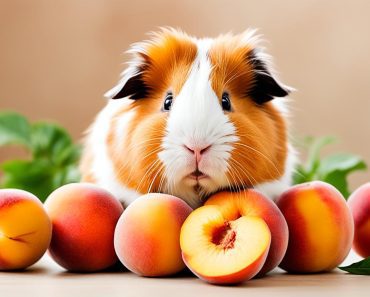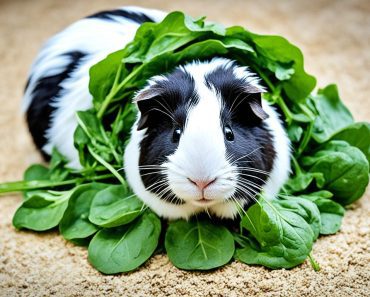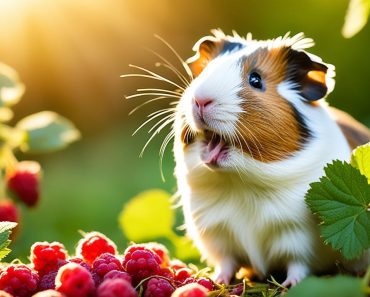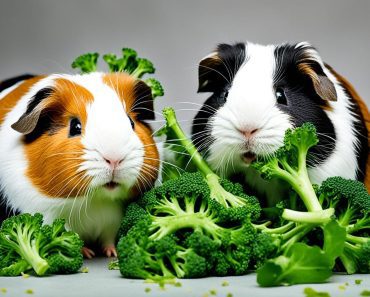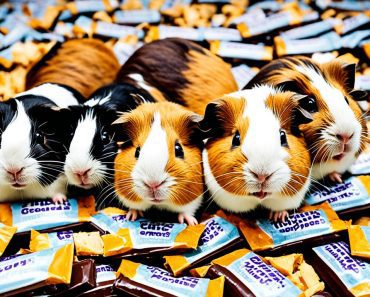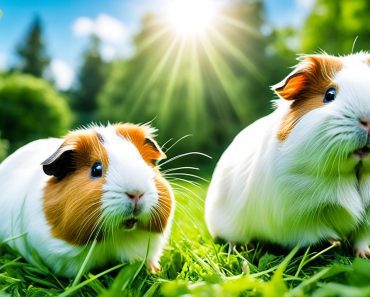Greetings! Today, we’re going to explore an important question: Can guinea pigs eat peas? As a guinea pig owner myself, I understand the importance of providing a safe and nutritious diet for our adorable furry friends. So, let’s dive in and discover the facts about feeding peas to guinea pigs.
Firstly, peas can actually be a beneficial addition to your guinea pig’s diet. They are packed with fiber, vitamin C, and other essential nutrients that contribute to their overall well-being. However, it’s crucial to offer peas in moderation and ensure they are fresh and prepared correctly to avoid any digestive issues.
It’s always wise to consult with a veterinarian before introducing new foods to your guinea pig’s diet. This ensures that the peas or any other food you plan to offer are safe and suitable for your adorable companion.
Can Guinea Pigs Eat Peas? Yes, every once on a while.
- Peas can be a nutritious addition to a guinea pig’s diet, as they are high in fiber and vitamin C.
- Feed peas to guinea pigs in moderation and ensure they are fresh and properly prepared.
- Consult with a veterinarian before introducing new foods to your guinea pig’s diet.
- Offer peas as an occasional treat alongside their regular diet of hay, pellets, and fresh vegetables.
- Monitor your guinea pig for any signs of digestive issues and seek veterinary advice if needed.
The Benefits of Peas for Guinea Pigs
Peas offer several health benefits for guinea pigs. They are rich in fiber, which promotes a healthy digestive system and helps prevent constipation. Peas are also a good source of vitamin C, an essential nutrient that guinea pigs cannot produce on their own. Vitamin C is important for their overall health, as it supports their immune system and helps prevent scurvy. Additionally, peas contain antioxidants and other nutrients that contribute to a well-balanced diet for guinea pigs.
If you’re wondering why peas are such a great addition to your guinea pig’s diet, let’s take a closer look at the benefits:
- Fiber: Peas are packed with fiber, which aids in digestion and helps prevent digestive issues like constipation. A healthy digestive system is vital for the overall well-being of your guinea pig.
- Vitamin C: Guinea pigs require a daily intake of vitamin C, and peas are a natural source of this essential nutrient. Vitamin C plays a crucial role in supporting their immune system, promoting healthy skin and coat, and preventing scurvy.
- Antioxidants: Peas contain antioxidants that help protect your guinea pig’s cells from damage caused by free radicals. These antioxidants contribute to their overall health and well-being.
- Other Nutrients: Along with fiber and vitamin C, peas contain other essential nutrients that are important for guinea pigs’ health. They provide vitamins, minerals, and protein, contributing to a well-balanced diet.
Adding peas to your guinea pig’s diet can be as simple as incorporating them into their regular feeding routine. They can be served fresh or lightly steamed to preserve their nutritional value. Remember to introduce any new foods gradually and monitor your guinea pig’s response to ensure they tolerate them well.
How much peas should you feed your guinea pig?
While peas offer several health benefits, it’s important to feed them in moderation. Peas should only be given as an occasional treat rather than a staple food. A small portion of peas a few times a week alongside their regular diet of hay, pellets, and fresh vegetables is sufficient. This ensures a well-rounded, balanced diet for your furry friend.
Remember: Every guinea pig is unique, and their dietary needs may vary. It’s always a good idea to consult with a veterinarian who specializes in small animal care for personalized advice regarding your guinea pig’s specific dietary needs.
| Benefits of Peas for Guinea Pigs | Description |
|---|---|
| Fiber | Promotes a healthy digestive system and prevents constipation |
| Vitamin C | Essential nutrient for guinea pigs’ overall health, supports their immune system, and helps prevent scurvy |
| Antioxidants | Protects cells from damage caused by free radicals |
| Other Nutrients | Provides vitamins, minerals, and protein for a well-balanced diet |
How to Feed Peas to Guinea Pigs Safely
When it comes to feeding peas to your guinea pigs, it’s crucial to prioritize their safety and well-being. By following these guidelines, you can ensure that your furry friends enjoy peas as a healthy and safe treat.
Choose Fresh and Mold-Free Peas
When offering peas to your guinea pigs, only opt for fresh peas that are free from any signs of spoilage or mold. This ensures that the peas are at their peak nutritional value and do not pose any health risks to your pets.
Avoid Cooked or Canned Peas
Cooked or canned peas may contain added salt and other additives that can be harmful to guinea pigs. It’s best to steer clear of these varieties and opt for fresh peas instead to provide your furry companions with the safest and healthiest option.
Peas as an Occasional Treat
When incorporating peas into your guinea pigs’ diet, it’s important to offer them as an occasional treat rather than a staple food. Serve a small portion of peas a few times a week alongside their regular diet of hay, pellets, and fresh vegetables. This helps maintain a balanced and varied diet for your guinea pigs.
Wash and Remove Pesticide Residue
Before serving peas to your guinea pigs, make sure to wash them thoroughly to remove any pesticide residue. This extra precaution ensures that your pets are not exposed to harmful chemicals that may be present on the surface of the peas.
Safe Foods for Guinea Pigs
| Foods | Description |
|---|---|
| Carrots | High in vitamin A, carrots make a crunchy and nutritious snack for guinea pigs. |
| Bell Peppers | Rich in vitamin C, bell peppers add a burst of color and flavor to your pets’ diet. |
| Cucumbers | Refreshingly hydrating and low in calories, cucumbers are a great choice for guinea pigs’ hydration needs. |
| Spinach | Packed with vitamins and minerals, spinach provides a nutritious addition to your guinea pigs’ diet. |
Note: Remember to introduce new foods gradually and monitor your guinea pigs’ response to ensure they tolerate them well.
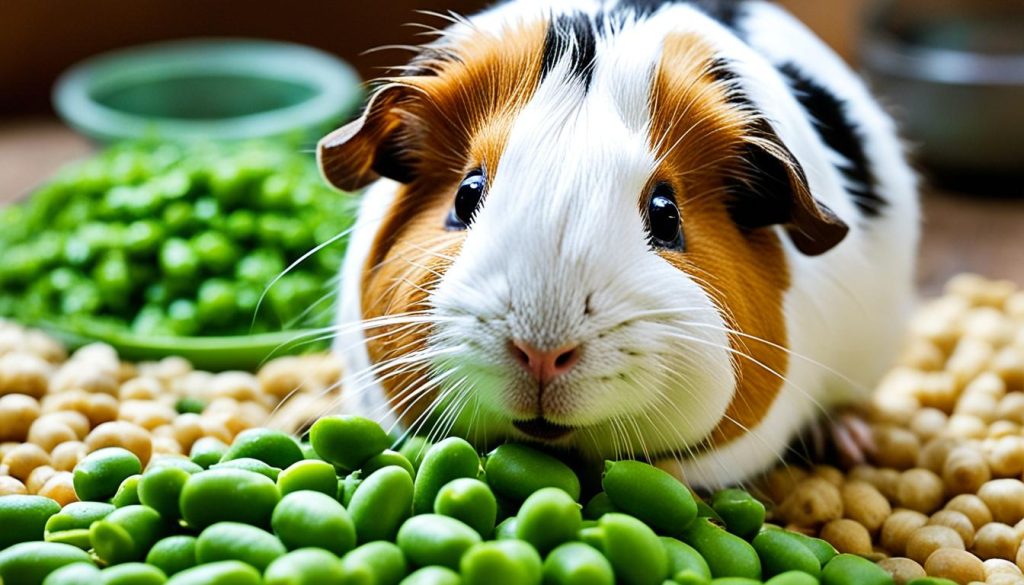
By following these feeding guidelines and offering peas as a treat in moderation, you can provide your guinea pigs with a safe and varied diet that includes the nutritional benefits of peas. Remember to consult with a veterinarian for personalized advice on your guinea pigs’ specific dietary needs.
Other Safe Snacks for Guinea Pigs
Alongside peas, there are many other safe and healthy snacks that you can offer to your guinea pig. Providing a variety of snacks ensures a well-rounded and nutritious diet for these adorable pets. Here are some options:
1. Vegetables:
Guinea pigs can enjoy a range of vegetables that are packed with essential nutrients. Some safe options include:
- Carrots
- Bell peppers
- Cucumbers
- Spinach
- Kale
These vegetables can be given in small amounts as part of their balanced diet. Remember to introduce new foods gradually and monitor your guinea pig’s response to ensure they tolerate them well.
2. Fruits:
Guinea pigs can also enjoy small amounts of fruits as an occasional treat. Some fruits that are safe for them to eat include:
- Apples
- Berries
- Melons
As with vegetables, it’s important to offer fruits in moderation and observe how your guinea pig reacts to them.
3. Hay and Pellets:
Aside from snacks, guinea pigs should have access to unlimited high-quality hay, such as Timothy or orchard grass. Hay is crucial for their digestion and dental health. Additionally, specially formulated pellets for guinea pigs can be given in small amounts to complement their diet.
Remember, while these snacks are safe for guinea pigs, they should not replace their main diet of hay, pellets, and fresh vegetables. Excessive amounts of snacks can lead to health issues, so always ensure a balanced approach.
Creating a Balanced Diet for Guinea Pigs
Providing a balanced diet is essential for the overall health and well-being of guinea pigs. In addition to fresh vegetables like peas, guinea pigs should have access to unlimited high-quality hay, such as Timothy or orchard grass. This is important for proper digestion and to wear down their continuously growing teeth.
Pellets formulated specifically for guinea pigs can also be given in small amounts to provide additional nutrients. Fresh water should always be available to guinea pigs, and vitamin C supplements may be necessary if their diet does not provide enough of this essential nutrient.
Guinea pigs have unique dietary needs, and it’s essential to ensure they receive a variety of nutrients from different sources. Here’s an example of a balanced diet for a guinea pig:
| Food | Amount |
|---|---|
| Fresh vegetables | 1 cup daily |
| Hay (Timothy or orchard grass) | Unlimited |
| Pellets | 1/8 cup daily |
| Water | Always available |
Remember to introduce new foods gradually and monitor your guinea pig’s response. If you notice any digestive issues or changes in their behavior, consult with a veterinarian for guidance.
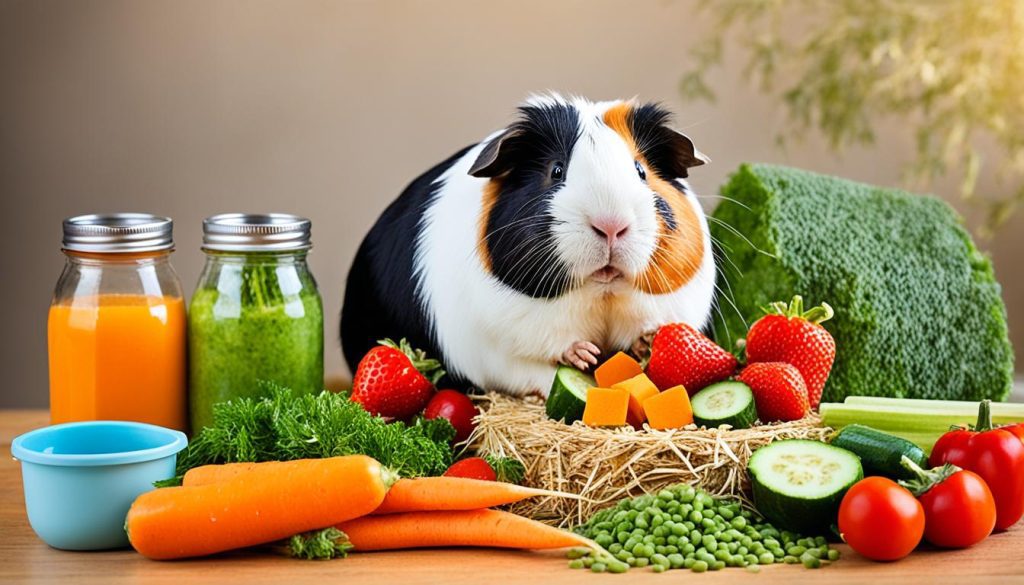
Signs of Digestive Issues in Guinea Pigs
While incorporating peas into a guinea pig’s diet can be beneficial, it’s crucial to remain vigilant regarding their digestion to identify any potential digestive problems. The following are common signs of digestive issues in guinea pigs:
- Decreased appetite: A sudden loss of interest in food or a significant reduction in food consumption.
- Changes in stool consistency: Diarrhea, constipation, or the presence of unusual colors or textures.
- Bloating: Swelling or distention of the abdomen.
- Weight loss: A noticeable decrease in body weight.
If you observe any of these symptoms in your guinea pig, it’s crucial to consult a veterinarian immediately. Digestive issues in guinea pigs can be severe and may require prompt medical intervention.
Consulting with a Veterinarian
When it comes to guinea pig health, consulting with a veterinarian who specializes in small animal care is crucial. Veterinarians have the knowledge and expertise to provide personalized guidance on all aspects of your guinea pig’s well-being, including their diet. Whether you have questions about portion sizes, the frequency of treats, or necessary supplements, a veterinarian can offer valuable insights tailored to your pet’s specific needs.
A regular check-up with a veterinarian is not only helpful for preventive care but can also help catch any potential health issues early on. They will conduct a thorough examination, assessing your guinea pig’s overall health, dental hygiene, and body condition. They may also recommend further diagnostics, such as blood tests or X-rays, to ensure a comprehensive evaluation.
“Regular veterinary care is essential for guinea pig health, as it allows for early detection of any potential problems and the opportunity for prompt treatment. Don’t hesitate to reach out to your veterinarian if you notice any changes in your guinea pig’s behavior, appetite, or appearance.”
During your visit, you can discuss any concerns you have about your guinea pig’s health and well-being. The veterinarian can address specific issues, such as weight management, dental care, and guinea pig behavior. They can also offer advice on providing a stimulating environment for your furry friend, including suitable toys and activities that promote mental and physical stimulation.
Choosing a Veterinarian
When selecting a veterinarian for your guinea pig, it’s essential to find a professional who has experience with small animals, specifically guinea pigs. Look for a veterinarian who is knowledgeable about their unique needs and is up-to-date with the latest advancements in guinea pig care.
You can start by asking fellow guinea pig owners and seeking recommendations from trusted sources. Online communities and forums dedicated to guinea pig care can also be valuable resources for finding reputable veterinarians in your area.
Preparing for the Veterinary Visit
Prior to your visit, it’s helpful to make a list of questions or concerns you want to discuss with the veterinarian. This ensures that you cover all relevant topics during the visit. Be sure to provide the veterinarian with a detailed history of your guinea pig’s diet, environment, and any changes you have observed in their behavior or health.
It’s also crucial to make transportation arrangements that prioritize your guinea pig’s safety and comfort. Use a secure carrier that provides adequate ventilation and protection. Put some familiar bedding in the carrier to help your guinea pig feel more at ease during the journey.
Final Thoughts
Consulting with a veterinarian who specializes in small animal care is essential for ensuring the optimal health and well-being of your guinea pig. They can provide personalized guidance, preventative care, and timely treatment for any health issues that may arise. By working closely with a veterinarian, you can create the best possible environment and diet for your furry friend, promoting a long and happy life.
Conclusion
Peas can be a safe and nutritious addition to a guinea pig’s diet when fed in moderation and prepared properly. They offer several health benefits, as they are high in fiber and vitamin C. However, it’s important to remember that peas should not be the sole focus of your guinea pig’s diet. They should be given alongside a variety of vegetables, hay, and pellets to ensure a well-rounded and balanced diet.
When feeding peas to your guinea pig, always consult with a veterinarian to ensure they are safe and suitable for your pet. Veterinarians specializing in small animal care can provide personalized guidance on the best diet for your guinea pig, including portion sizes and frequency of treats. Regular check-ups with a veterinarian are also important to monitor your guinea pig’s health and catch any potential issues early on.
Remember to introduce new foods gradually and monitor your guinea pig’s response. If you notice any signs of digestive issues or other abnormal behaviors, consult with a veterinarian as soon as possible. Providing proper nutrition and care is essential for the overall health and well-being of your beloved guinea pig.

